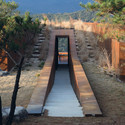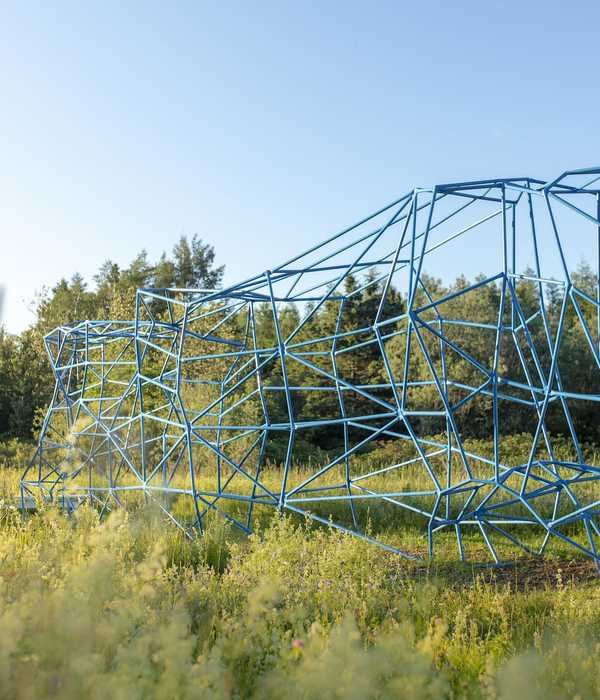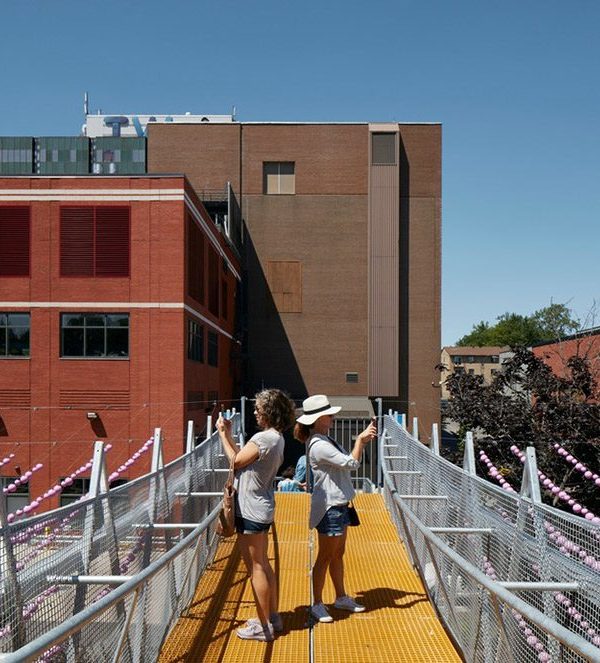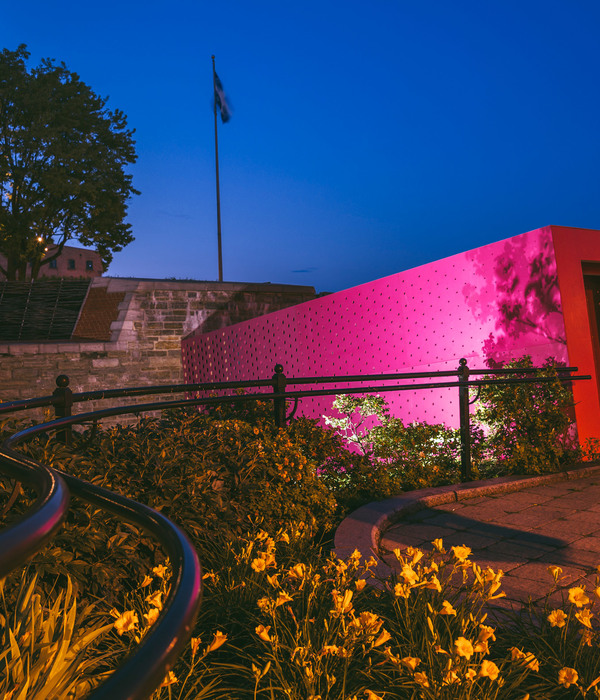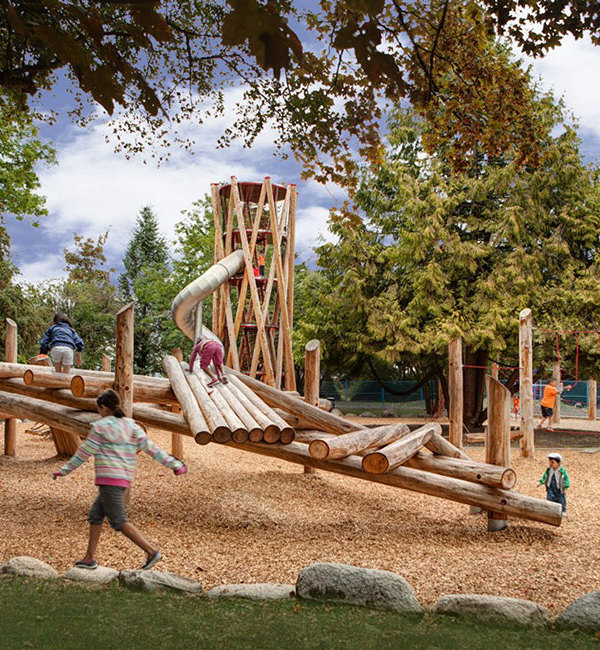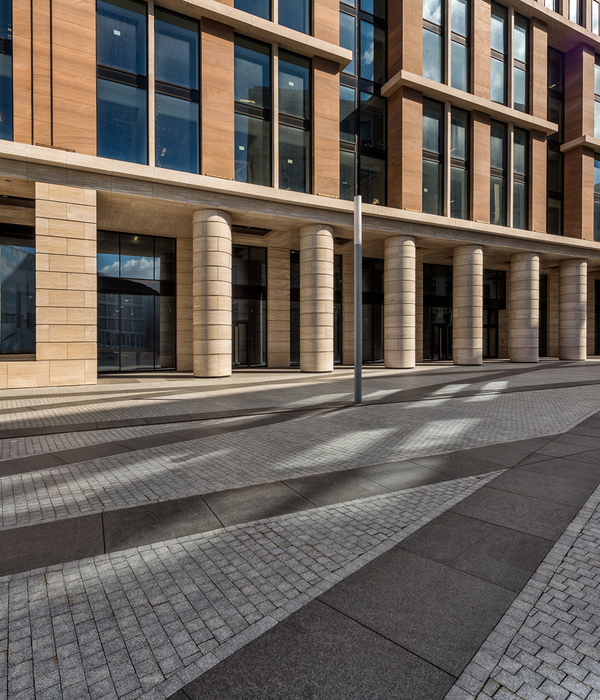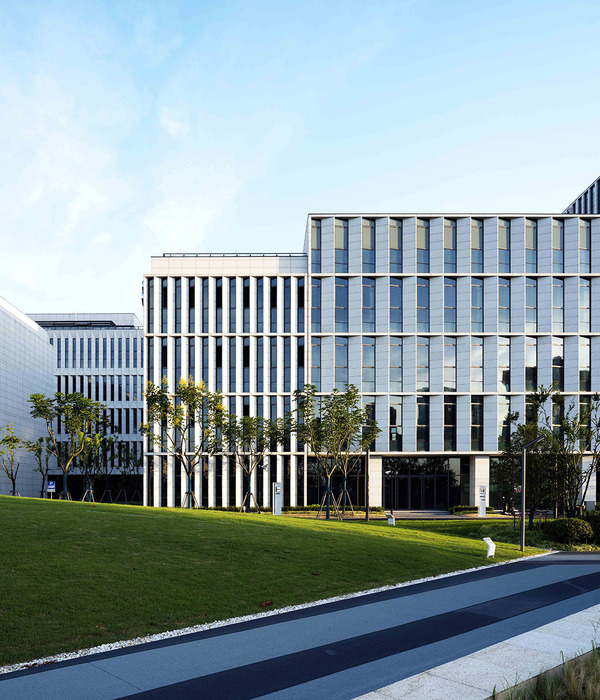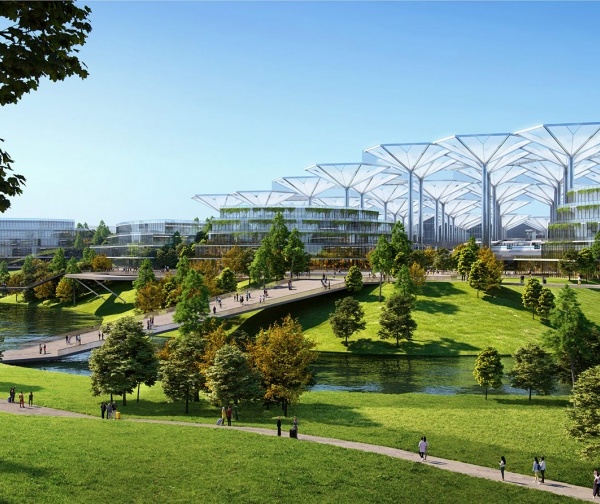生死之间的静谧之城
建筑师提供的文字说明。这个建筑代表了死者的设施。作为死亡的名义聚集了 10 万生命的地方,它是一个社区和死者的城市。所以我决定把整个建筑设计成一套完整的城市所需的设施。
Text description provided by the architects. This architecture represents a facility for the dead. Being a place where ten thousand lives are gathered in the name of death, it is a community and city of the dead. So I decided to design the whole architecture as a complete set of required facilities for a city.
Text description provided by the architects. This architecture represents a facility for the dead. Being a place where ten thousand lives are gathered in the name of death, it is a community and city of the dead. So I decided to design the whole architecture as a complete set of required facilities for a city.
© JongOh Kim
c.Jongoh Kim
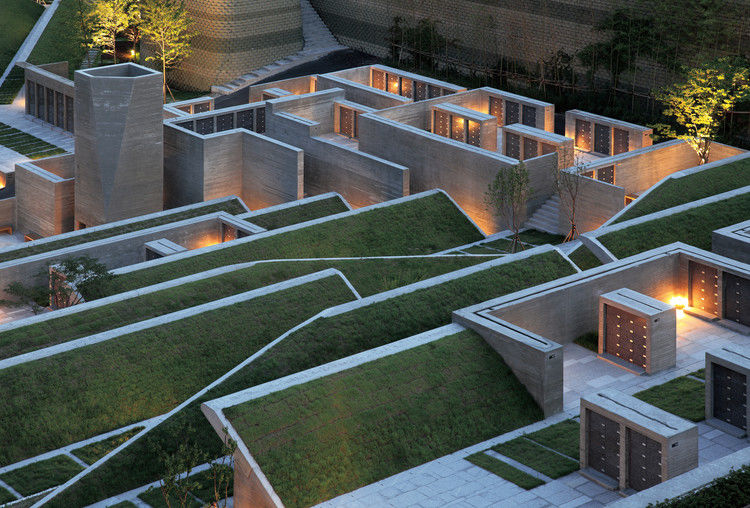
由于这座城市位于一个斜坡上,这是一项规则,使每个单独的住房遵循梯田式的房子的形式。由于草地覆盖了房屋的屋顶下面,每个梯田房子的前侧是一个独立的领土。从鸟瞰的角度看,整个地方看起来就像一个完全被绿地覆盖的独特的公园。
With the city located on a slope, it was a rule to make each individual shelter follow the format of a terraced house. Due to grasses covering the roof of houses below, the front side of each terraced house is an independent territory. From a bird’s eye view, the whole place looks like a unique park completely covered with green space.
Courtesy of IROJE Architects & Planners
IROJE 建筑师的礼遇
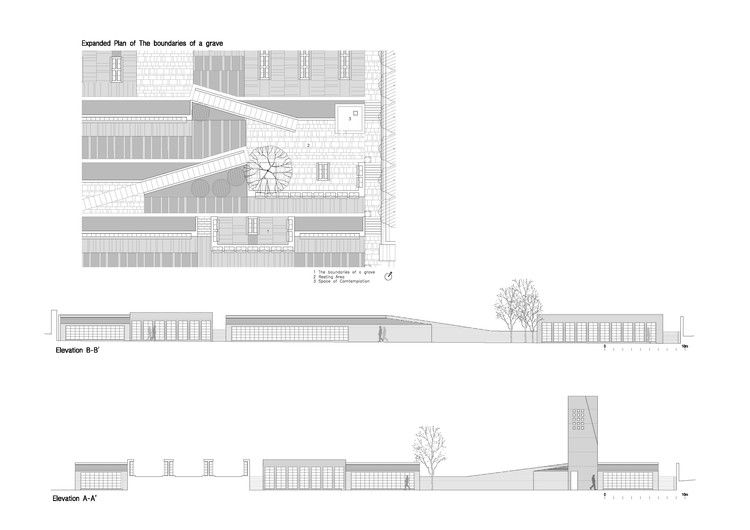
适当大小的梯田的集合代表一个小社区,通过斜坡或台阶上的路径连接到其他社区。包括小公园和广场以及每个社区的保护区在内的共享设施位于社区之间的连接处。
A gathering of terraced houses in appropriate sizes represents a small community, connected to other communities through paths on the slope or steps. Shared facilities including small parks and squares as well as the sanctuary of each community are located at the joint between the communities.
© JongOh Kim
c.Jongoh Kim
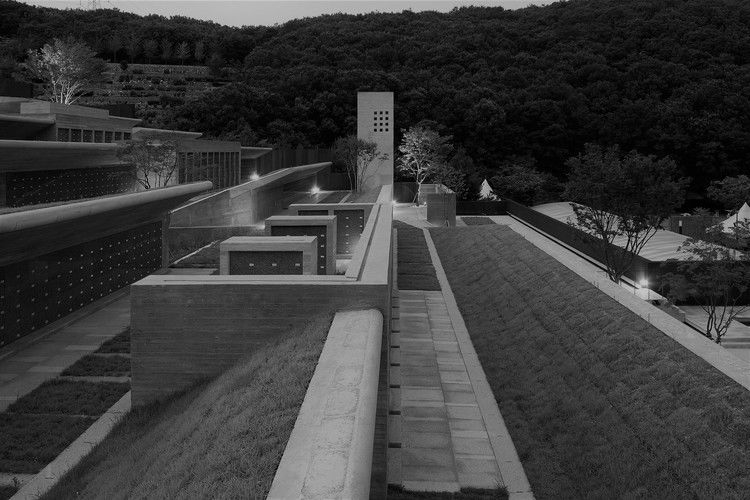
这座城市的主广场在入口处。它的地板被水覆盖,四周都是由耐候钢制成的高墙,这个地方最终告诉游客,它是一座新的寂静之城。
The main square for the city is located at the bottom entrance. With its floor covered by water and surrounded by high walls made of weathering steel, this place eventually tells its visitors that it is a new city of silence.
© JongOh Kim
c.Jongoh Kim
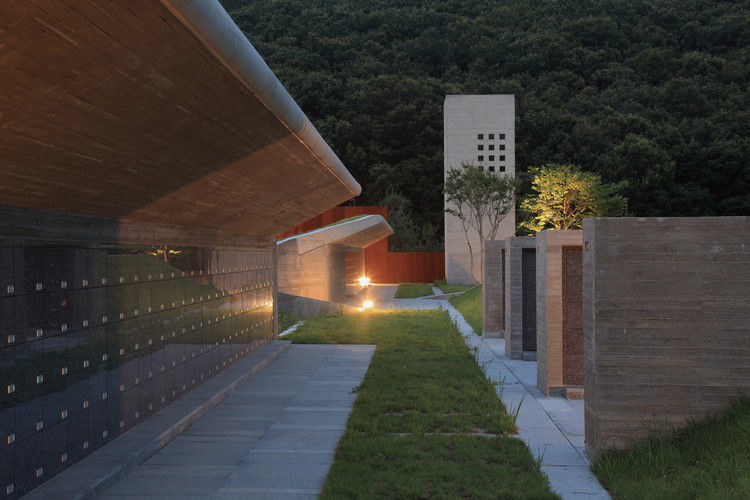
想想看,墓地不是死人的地方。人是由四样东西组成的:身体 (體)、肉体 (肉)、灵魂 (靈) 和灵魂 (魂)。身体和肉体变成一具尸体,通常埋在坟墓里,但它们最终会消散并停止存在。当被焚毁时,它们只是一个象征,不能见证人的身体和肉体的存在。
To think of it, graveyard is not a place for the dead. A human being consists of four things: body (體), flesh (肉), soul (靈), and spirit (魂). While body and flesh become a corpse and usually buried in a grave, they dissipate and cease to exist in the end. When incinerated, they are merely a symbol and cannot witness the existence of body and flesh of the person. © JongOh Kim
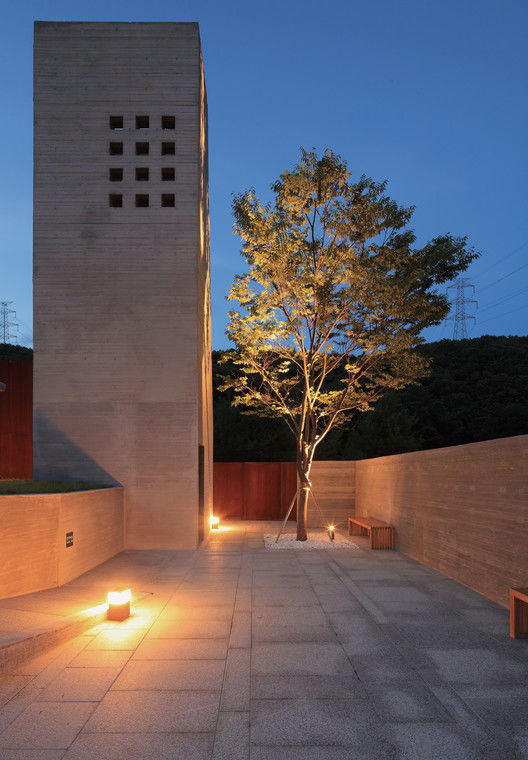
灵魂,代表着人类的思想、情感和激情,在死亡的时候也会灭绝。灵魂是在死亡中幸存下来的唯一东西:它是一个从一开始就自由进出人体的无约束的存在。然而,一旦一个灵魂失去了属于这个世界的肉体,它就不能留在坟墓里,被驱逐到另一个世界。
Soul, which represents human mind, emotion, and passion, also goes extinct at the point of death. Spirit is the only thing that survives death: it is an unconstrained being that freely comes in and out of human body from the first place. However, once a soul loses its body and flesh that belong to this world, it cannot remain in the grave and ousted to another world.
Courtesy of IROJE Architects & Planners
IROJE 建筑师的礼遇
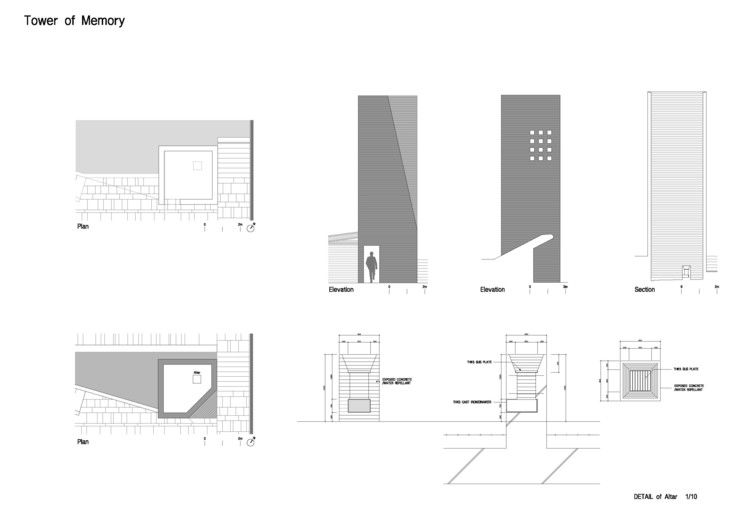
这是一首诗,据说起源于一首英明的印度人的歌“千风”。
Here is a poem that is said to have been originated from a song of wise Indians, A Thousand Wind.
© JongOh Kim
c.Jongoh Kim
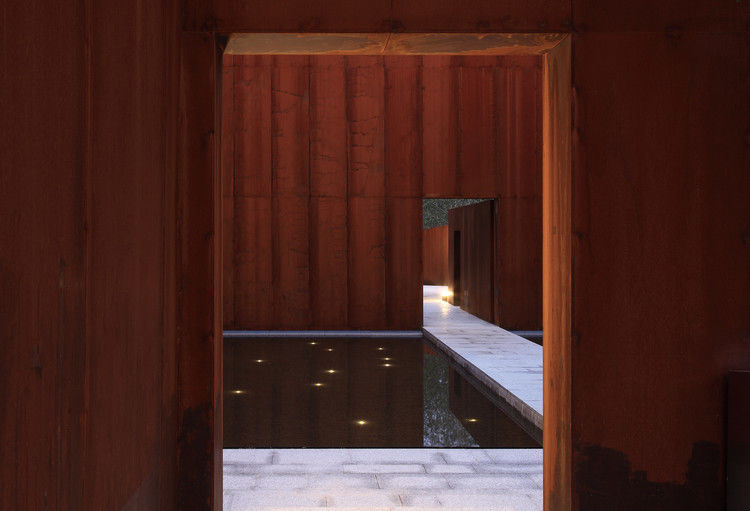
"不要站在我的坟墓里哭泣,我不在那里。我不睡觉。我是一万个吹来的风。我是雪上的钻石。我是成熟谷物上的阳光。我是温和的秋雨。当你早上醒来的时候,我是敏捷的提升的高峰。在盘旋的飞行中,安静的鸟儿。我是夜晚闪耀的柔和的星星。不要站在我的坟墓和哭泣;我不在那里。我没有死。”
"Do not stand at my grave and weep I am not there. I do not sleep. I am a thousand winds that blow. I am the diamond glints on snow. I am the sunlight on ripened grain. I am the gentle autumn rain. When you awaken in the morning’s hush I am the swift uplifting rush. Of quiet birds in circled flight. I am the soft stars that shine at night. Do not stand at my grave and cry; I am not there. I did not die."
Courtesy of IROJE Architects & Planners
IROJE 建筑师的礼遇
这首诗说的似乎是对的。住在墓地里的不是死者,而是我们对死者的记忆。我们应该把墓地定义为一个地方和风景,在那里我们可以回忆死者的记忆,审视自己,而不是为死者着想。因此,参观一个墓地或让它在附近是关于确保我们的生活的真实性。所以我把这座建筑作为当时的风景,在我们参观的地方,每当我们怀疑自己的身份时,我都会在庄严的静默中提醒人类生活中的美丽。-承汉生
What the poem says seems to be right. It is not the dead who dwell in a graveyard: it is our memory of the deceased that lingers there. We should define graveyard as a place and scenery where we bring back the memory of the dead and look into ourselves, not as a place for the dead. Therefore, visiting a graveyard or having it nearby is about ensuring the authenticity of our lives. So I proposed this architecture as scenery of the very moment at a place where we visit to remind the beauty in human life in solemn silence whenever we are in doubt of our identity. - Seung H-Sang
© JongOh Kim
c.Jongoh Kim
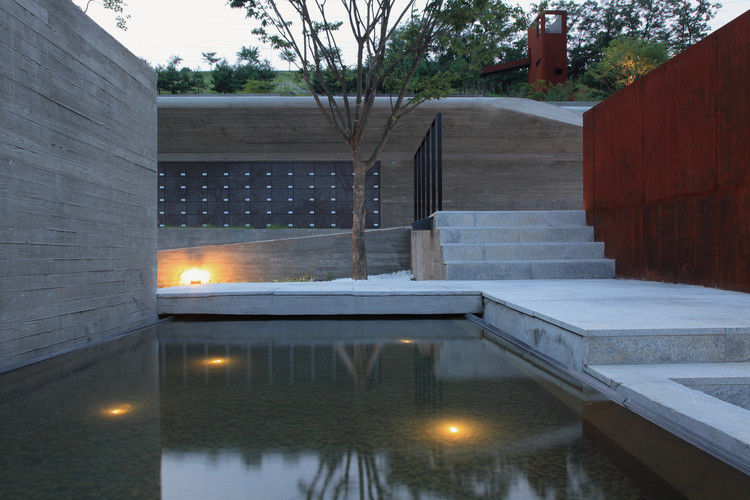

Architects IROJE Architects & Planners
Location Neungpyeong-ri, Opo-eup, Gwangju-si, Gyeonggi-do, South Korea
Lead Architects Seung H-Sang
Area 18860.0 m2Project Year 2016
Photographs JongOh Kim
Category Theme Parks

